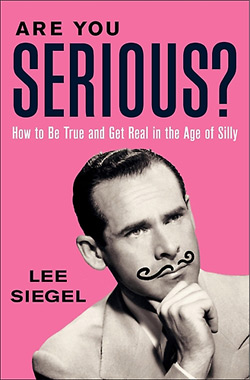 “You cannot be serious”, goes the oft quoted opening to a John McEnroe javelin thrown at an unsuspecting tennis umpire. This leads us to an earnest review of what is means to be serious from Lee Siegel’s new book, “Are You Serious?” As Michael Agger points out for Slate:
“You cannot be serious”, goes the oft quoted opening to a John McEnroe javelin thrown at an unsuspecting tennis umpire. This leads us to an earnest review of what is means to be serious from Lee Siegel’s new book, “Are You Serious?” As Michael Agger points out for Slate:
We don’t know what to take seriously anymore. Is Brian Williams a serious news anchor or is he playing at being serious? How about Jon Stewart? The New York Times exudes seriousness, but the satire of The Onion can also be very serious.
Do we indeed need a how-to manual on how to exude required seriousness in the correct circumstances? Do we need a 3rd party narrator to tell us when to expect seriousness or irony or serious irony? Perhaps Lee Siegel’s book can shed some light.
[div class=attrib]More from Slate’s review of Siegel’s book:[end-div]
Siegel’s business-casual jaunt through seriosity begins with the Victorian poet Matthew Arnold, who saw the decline of religious spirit and proposed the “high seriousness” of poetry and literature in its place. “Seriousness implied a trustworthy personality,” Siegel writes, “just as faith in God once implied a trustworthy soul.” The way in which Arnold connected morality to cultural refinement soothed the intellectual insecurity of Americans vis-à-vis Europe and appealed to our ethos of self-improvement. The contemporary disciples of Arnold are those friends of yours who read Ulysses along with Ulysses Annotated, actually go to art galleries, and know their way around a Ring cycle. The way they enjoy culture expresses their seriousness of purpose.
I’ve only pulled at a few of the provocative strings in Siegel’s book. His argument that Sarah Palin is someone who has signaled seriousness by being willing to humiliate herself on reality TV makes a wild sort of sense. At other times, Siegel floats some nonsense that he knows to be silly.
But I don’t want to leave you hanging without providing Siegel’s answer to the question of finding seriousness in life. He gives us his “three pillars”: attention, purpose, continuity. That could mean being a really competent lawyer. Or being so skilled at being a pilot that you land a plane on the Hudson and save everyone onboard. Or being like Socrates and drinking the hemlock to prove that you believed in your ideas. Just find the thing that makes you “fully alive” and then you’re set. Which is to say that although the cultural and political figures we should take seriously change, the prospect of becoming a serious person remains dauntingly unchanged.
[div class=attrib]More from theSource here.[end-div]
